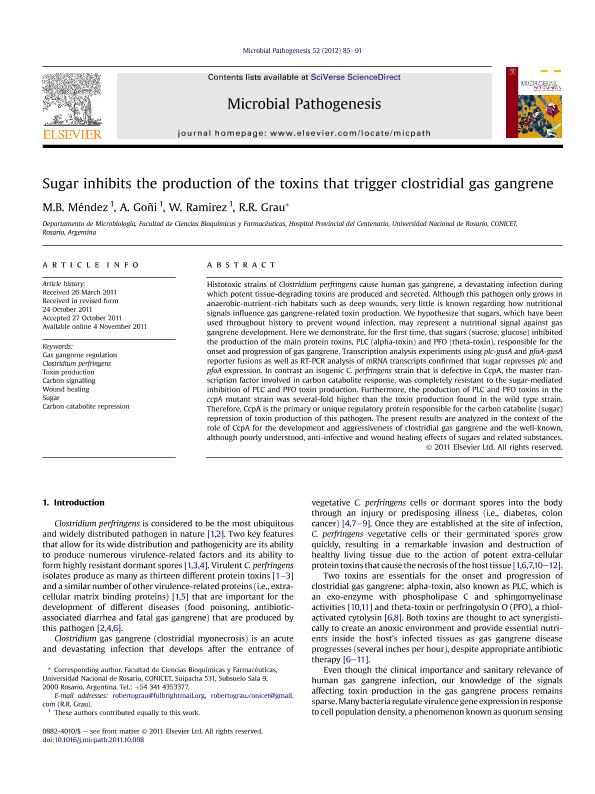Artículo
Sugar inhibits the production of the toxins that trigger clostridial gas gangrene
Fecha de publicación:
01/2012
Editorial:
Academic Press Ltd - Elsevier Science Ltd
Revista:
Microbial Pathogenesis
ISSN:
0882-4010
Idioma:
Inglés
Tipo de recurso:
Artículo publicado
Clasificación temática:
Resumen
Histotoxic strains of Clostridium perfringens cause human gas gangrene, a devastating infection during which potent tissue-degrading toxins are produced and secreted. Although this pathogen only grows in anaerobic-nutrient-rich habitats such as deep wounds, very little is known regarding how nutritional signals influence gas gangrene-related toxin production. We hypothesize that sugars, which have been used throughout history to prevent wound infection, may represent a nutritional signal against gas gangrene development. Here we demonstrate, for the first time, that sugars (sucrose, glucose) inhibited the production of the main protein toxins, PLC (alpha-toxin) and PFO (theta-toxin), responsible for the onset and progression of gas gangrene. Transcription analysis experiments using plc-gusA and pfoA-gusA reporter fusions as well as RT-PCR analysis of mRNA transcripts confirmed that sugar represses plc and pfoA expression. In contrast an isogenic C. perfringens strain that is defective in CcpA, the master transcription factor involved in carbon catabolite response, was completely resistant to the sugar-mediated inhibition of PLC and PFO toxin production. Furthermore, the production of PLC and PFO toxins in the ccpA mutant strain was several-fold higher than the toxin production found in the wild type strain. Therefore, CcpA is the primary or unique regulatory protein responsible for the carbon catabolite (sugar) repression of toxin production of this pathogen. The present results are analyzed in the context of the role of CcpA for the development and aggressiveness of clostridial gas gangrene and the well-known, although poorly understood, anti-infective and wound healing effects of sugars and related substances.
Archivos asociados
Licencia
Identificadores
Colecciones
Articulos(CCT - ROSARIO)
Articulos de CTRO.CIENTIFICO TECNOL.CONICET - ROSARIO
Articulos de CTRO.CIENTIFICO TECNOL.CONICET - ROSARIO
Citación
Méndez, M. B.; Goñi, Anibal Juan; Ramirez, W.; Grau, Roberto Ricardo; Sugar inhibits the production of the toxins that trigger clostridial gas gangrene; Academic Press Ltd - Elsevier Science Ltd; Microbial Pathogenesis; 52; 1; 1-2012; 85-91
Compartir
Altmétricas




